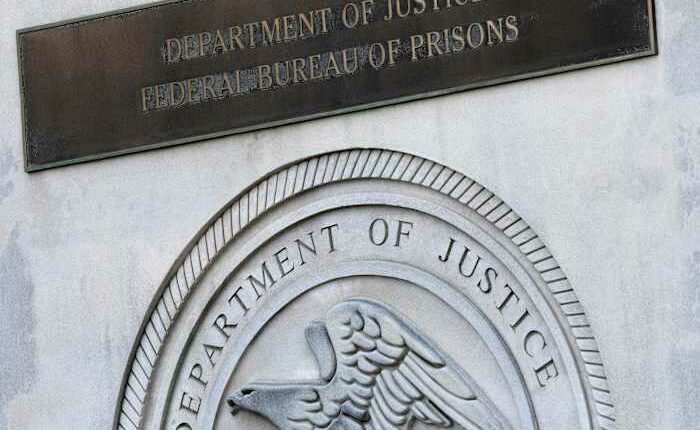Share this @internewscast.com

The federal Bureau of Prisons has announced the closure of Terminal Island, a correctional facility situated near Los Angeles, due to serious concerns over degrading infrastructure. An internal memo obtained by the Associated Press reveals that deteriorating conditions, such as falling concrete, pose significant risks to the facility’s heating system and overall safety.
In a statement to staff on Tuesday, Director William K. Marshall III confirmed that operations at the Federal Correctional Institution, Terminal Island, will be suspended. This low-security prison currently houses approximately 1,000 male inmates along the Californian coastline.
Marshall described the decision as difficult yet imperative. He emphasized that the suspension of activities, although challenging, is a necessary measure to address the pressing safety issues.
The closure of FCI Terminal Island fits into a broader pattern of shutdowns within the Bureau of Prisons, which is grappling with significant challenges. The agency is facing a $3 billion backlog in repairs, severe staff shortages, and the added responsibility of accommodating thousands of detainees under policies from the Trump administration targeting immigration.
This decision mirrors a similar closure in 2021 when the agency shuttered its federal jail in Manhattan due to similar infrastructure concerns.
Marshall highlighted a particular issue with the underground tunnels that encase the facility’s steam heating system. The ceilings in these tunnels have begun to crumble, with pieces of concrete falling, thereby endangering both facility employees and the heating system itself.
“We are not going to wait for a crisis,” Marshall wrote. “We are not going to gamble with lives. And we are not going to expect people to work or live in conditions that we would never accept for ourselves.”
Bureau of Prisons spokesperson Randilee Giamusso, responding to the AP’s questions about FCI Terminal Island, confirmed that the agency is taking “immediate action” to “safeguard staff and inmates.”
Inmates at the facility, located near the Los Angeles and Long Beach ports, will be moved to other federal prisons “with a priority on keeping individuals as close as possible to their anticipated release locations,” Giamusso said.
The facility’s future will be decided once the Bureau of Prisons has “assessed the situation further and ensured the safety of all those involved,” she said.
The Bureau of Prisons, the Justice Department’s largest employer, has more than 30,000 workers, 122 facilities, about 155,000 inmates and an annual budget that exceeds $8.5 billion. But the agency’s footprint has shrunk over the last year as it wrestles with financial constraints, chronic understaffing and changing priorities.
An Associated Press investigation has uncovered deep, previously unreported flaws within the Bureau of Prisons, including rampant sexual abuse, widespread criminal activity by employees, dozens of escapes and the free flow of guns, drugs and other contraband.
In December 2024, in a cost-cutting move, the agency announced that it was idling six prison camps and permanently closing a women’s prison in Dublin, California, that had become known as the “rape club” because of rampant sexual abuse by the warden and other employees.
In February, a Bureau of Prisons official testifying about the agency’s vast repair backlog told Congress that 4,000 beds meant for inmates at various facilities were unusable because of dangerous conditions like leaking or failing roofs, mold, asbestos or lead.
At the same time, the agency is in the process of building a new prison in Kentucky and, at Trump’s direction, it is exploring the possibility of rebuilding and reopening Alcatraz, the notorious penitentiary in San Francisco Bay that last held inmates more than 60 years ago.
Marshall, his top deputy and Attorney General Pam Bondi visited Alcatraz in July, but four months later, it remains a tourist attraction and a relic of a bygone era in corrections.
In addition to failing facilities, the Bureau of Prisons has been plagued for years by severe staffing shortages that have led to long overtime shifts and the use of prison nurses, teachers, cooks and other workers to guard inmates.
That problem has only gotten worse in recent months, in part because of a hiring freeze and a massive recruiting effort by the U.S. Immigration and Customs Enforcement agency, which has lured correctional officers away with promises of signing bonuses of up to $50,000.
In September, Marshall announced that the Bureau of Prisons was canceling its collective bargaining agreement with workers. He said their union had become “an obstacle to progress instead of a partner in it.” The union, the Council of Prison Locals, is suing to block the move, calling it “arbitrary and capricious.”
Copyright 2025 The Associated Press. All rights reserved. This material may not be published, broadcast, rewritten or redistributed without permission.










